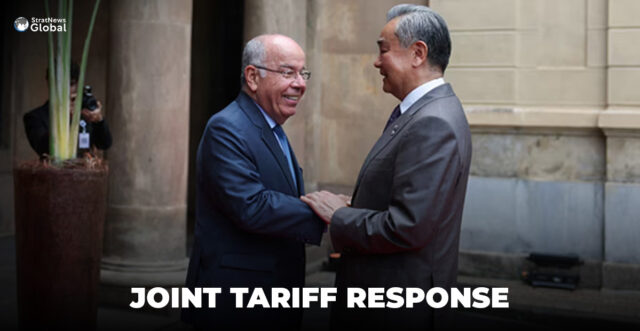Foreign ministers from the BRICS group of developing nations met on Monday to coordinate a joint defence of the global trade system and formulate a response to the wave of new tariffs imposed by U.S. President Donald Trump.
The meeting in Rio de Janeiro is expected to produce a joint statement criticising “unilateral measures” on trade from the group formed by Brazil, Russia, India, China and South Africa and recently expanded to include six more nations.
“The ministers are negotiating a declaration to reaffirm the centrality of… multilateral trade negotiations as the main axis of action in trade,” Brazilian Ambassador Mauricio Lyrio said. “They will reaffirm their criticism of unilateral measures of any origin, which has been a longstanding position of BRICS countries.”
Expanded BRICS Group Facing Challenges
The expanded BRICS group, which added Egypt, Saudi Arabia, the United Arab Emirates, Ethiopia, Indonesia and Iran last year, faces daunting challenges from U.S. trade actions.
China, which was hit with 145% tariffs on its exports to the United States, has pushed for a harsher tone in the communique, but, according to a source familiar with negotiations, the final text will be critical but not confrontational.
The BRICS group as a whole has come under fire from Trump, who threatened another 100% in tariffs if the bloc moves ahead with a single currency to replace the dollar in trade relations.
Brazil has already dropped the pursuit of a common currency in its BRICS presidency, Reuters reported in February, although its agenda may pave the way for less reliance on the U.S. dollar in global trade.
Climate Finance
With an eye on the United Nations climate summit Brazil is hosting in November, the BRICS ministers will also discuss a shared position on climate finance, a key priority for Brazil’s presidency.
Major developing nations, including China, face growing pressure from wealthier nations to contribute to financing adaptation and mitigation initiatives in the poorest countries.
“What is not on the agenda is the revision of which countries have to pay for the energy transition and the countries that can eventually, voluntarily, also finance it. This distinction is absolutely fundamental,” said Lyrio.
“The financial obligation to finance the fight against climate change and the energy transition in developing countries lies with rich countries,” he added.
(With inputs from Reuters)





